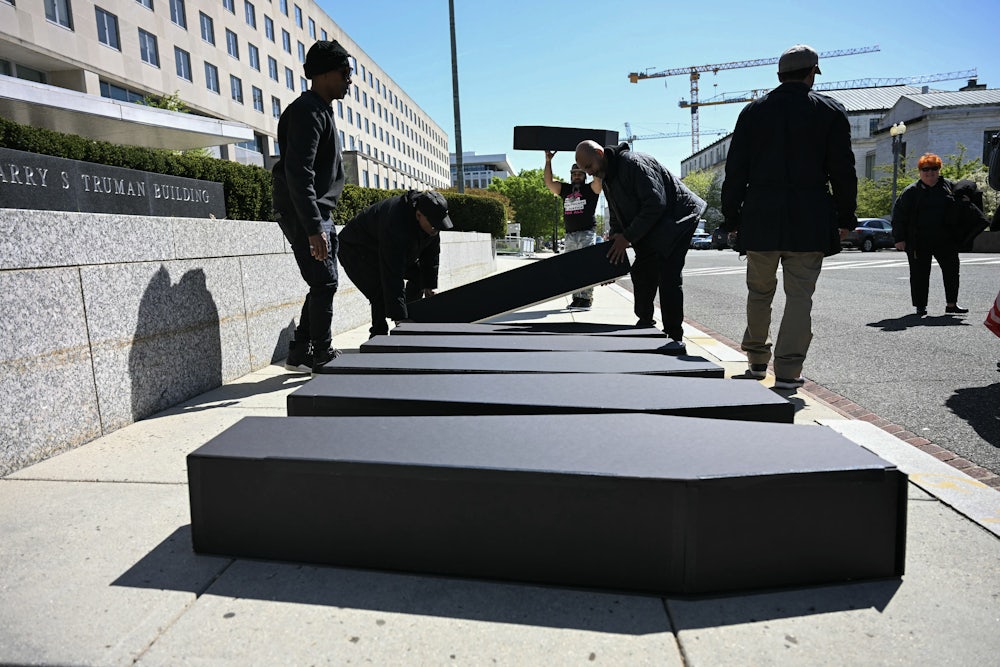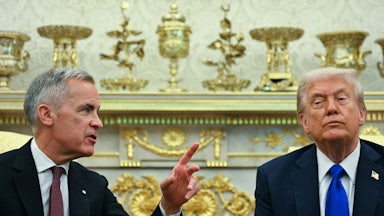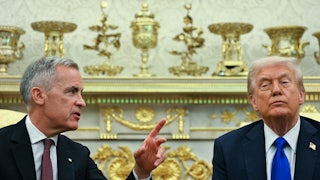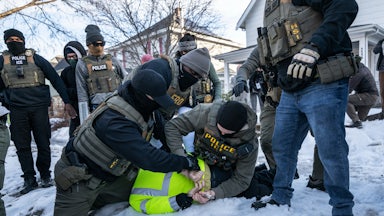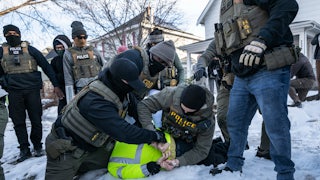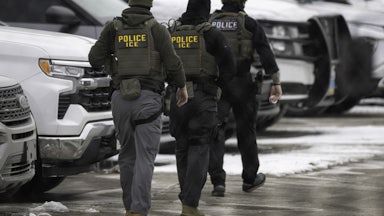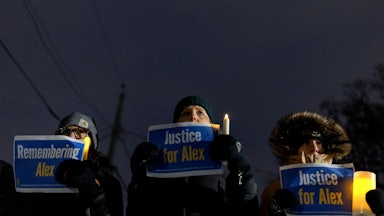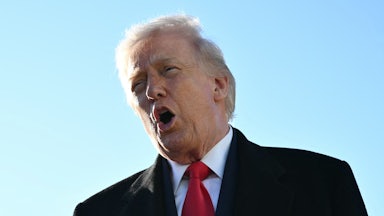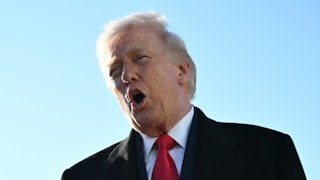A recently published study in the prestigious British medical journal The Lancet reports that the Trump administration’s evisceration of the landmark President’s Emergency Plan for AIDS Relief, or PEPFAR, program that has long been a bulwark in the fight to combat global HIV/AIDS has already sentenced tens of thousands of people in Africa to death, and with each week that passes with the program stuck in limbo, many thousands of needless deaths will follow.
PEPFAR is, by far, the most successful U.S. foreign aid program in history. Since George W. Bush launched it in 2003, it has provided life-giving anti-retroviral, or ARV, medications that have already saved an estimated 26 million lives, mostly in sub-Saharan Africa. That 26 million figure is no exaggeration or guesstimate—it has been confirmed in multiple scientific reports. PEPFAR has also prevented some 5.5 million mother-to-child transmissions of the deadly virus.
For these reasons, it’s shocking that the U.S. mainstream media is barely reporting on the PEPFAR crisis. This media malpractice contrasts decisively with the American press’s blanket coverage some decades ago, when HIV/AIDS was scything its way across Africa, killing more than two million people a year. The lack of attention now raises the uncomfortable suspicion that people in the global south are interesting to the American media only when they are dying in large numbers.
Beyond the millions of lives saved, PEPFAR is also a wildly successful extension of U.S. soft power, the absence of which will only create a vacuum for others to fill. As a former U.S. ambassador to Zambia warns, ending PEPFAR is, in this way, a substantial blow to American national security because it opens up space to both China and Russia to expand their already growing influence on the African continent.
The Lancet study offers up some grim details of the near future. Its 23 co-authors looked at nine countries in sub-Saharan Africa—which is only about half the nations that are most affected by the gutting of the program. Still, it concluded that Trump’s January 27 suspension of PEPFAR in those countries alone would eventually cause 60,000 additional deaths, even if the program were restarted after only 90 days. Those 90 days passed on April 27, and there are no signs that PEPFAR is about to be revived.
Those of us with firsthand experience in Africa, who witnessed both the scourge of AIDS and then the miraculous recovery though PEPFAR, are terrified at what we are seeing.
The program’s current status is not at all clear. First, the Trump administration canceled it entirely; then there was talk of a “waiver,” which was then apparently rescinded. This is where the mainstream U.S. media failure is particularly damaging, because firsthand reporting could answer these questions about what is actually happening in nations like Kenya, Zambia, and Tanzania. The New York Times has five correspondents in Africa; The Washington Post has two; the American cable news networks seem to have no problem sending their reporters to Ukraine or Israel-Palestine, but somehow Africa’s dire health emergency is passing unnoticed.
It was not always so. A quick search of The New York Times’ website for 1999 and 2000, back when HIV/AIDS was sweeping across the continent, revealed roughly 88 reports and opinion pieces over that two-year period. But now, since January 1, 2024, the grand total of articles is around 11.
It’s maddening that PEPFAR should find itself in political peril. The program was established by a Republican president, and has typically enjoyed overwhelming bipartisan support in Congress until recently. Among its most enthusiastic backers are evangelical Christians, both in America and Africa; evangelicals have long been deeply involved in health care in Africa and actually run a number of the hospitals there that help dispense the life-giving medications. They, and others, point out that the program has been a tremendous success, untouched by significant corruption scandals, despite its huge size.
Today, Shepherd Smith is part of a vigorous evangelical effort to persuade the U.S. Congress to revive PEPFAR. He and his wife, Anita Moreland Smith, started doing HIV/AIDS relief work in Africa back in the mid-1980s; they’ve been there more than 60 times. They head an organization based in Washington, D.C., called Children’s AIDS Fund International.
Smith told me that no one seems to know with any precision about the current status of PEPFAR programs across Africa. “I do hear a lot, but there’s no good information anywhere,” he said. “It’s an absolute mess. We do know that some PEPFAR programs are still operating, while others have closed. Virtually all of the orphan and vulnerable children’s sites have been closed.”
He estimates that PEPFAR right now is functioning at no better than one-third of its former capacity. And he warns that the Trump shutdown has done tremendous damage in only three months. “Many treatment sites had to let all their workers go,” he said. “Reconstructing a supply chain that has never been the very best is going to be extremely difficult.”
Smith and his allies are concentrating on lobbying conservative Republican members of Congress to restore PEPFAR to the budget legislation that is currently under consideration. He is optimistic. “We still have a lot of support in Congress,” he said. “On international HIV issues, the faith community is the strongest voice on the Hill.”
He encourages the public to lobby their own senators and members of Congress to revive the program.
Smith is also worried about the lack of U.S. media coverage about the PEPFAR crisis. “Will it take 25 million people in Africa dying to get people’s attention again?” he asked, “when enough attention now can prevent that from happening?”
Dan Foote was the U.S. ambassador to Zambia from 2017 to 2020, and was in charge of the PEPFAR program there. He echoes Smith’s concern that the Trump administration has already done critical damage. “Part of my job was to make sure that the ARV medications got from the capital, Lusaka, into the villages,” he told me. “I spent a lot of time going out into the countryside. You need to push the drugs out to where the people need them. It took time, but we were finally at the point where the distribution was working. But as soon as you disrupt that exceptionally complex supply chain, the chain breaks.”
Foote cautions that restarting the ARV distribution will not happen overnight. He warns that Trump’s threatened tariffs could further interfere with the procurement of the ARV drugs, which are imported from around the globe. “Turning the supply chain back on, full blast, could take as much as a year,” he said.
The former envoy also warns that ending PEPFAR could revive a global HIV/AIDS epidemic. “People in Zambia and in Africa who take the ARVs regularly have reduced their viral loads to an ‘undetectable’ level,” he explains. “That means you cannot transmit AIDS to others. Cut off the medications, and millions of people can spread the illness again. We live in a time of expanding international travel. HIV/AIDS will explode globally and eventually reach the United States.”
Foote also explained that the ARV drugs are expensive. “Maybe 2 percent of the Zambian people could afford them,” he said.
One of Foote’s most passionate pro-PEPFAR arguments is that the program is actually vital to America’s national security. “In order to have strong national security, we need to have robust alliances around the globe,” he said. “We need to have access to governments to build those alliances. So we need to do something for them. As ambassador, my only job was to promote America’s national interests, and PEPFAR was vital to that.”
He continued: “Both China and Russia are expanding their influence in Africa. When China wants to see senior government officials there, they get in the door by bringing a suitcase full of $100 bills. I got in by reminding them about PEPFAR.”
Foote concluded, “I can’t even calculate how much cutting PEPFAR has damaged America’s national security over the past 105 days.”
Those of us who witnessed the before and after with PEPFAR are horrified. Back in the early 1980s, I spent years based in the southern African nation Swaziland, now called Eswatini, reporting on apartheid and war across the region. Swaziland was one of the countries hit hardest by HIV/AIDS; I’ve made several return visits over the years since the disease first ravaged the population. In 2008, before PEPFAR took full effect, the epidemic was on the verge of destroying the country. Death notices filled the newspapers every single day. One friend, a professor at the national university, told me at the time: “Sometimes I look at the students in my biggest lecture course, who are 19, 20, 21 years old. There they are—talking, giggling, full of life, just as students always have been. And I think that if nothing changes, 10 years from now, one out of three of them will be dead.”
I went back to Swaziland eight years later, after the PEPFAR program had arrived in force. Precious Dube, a 50-year-old nurse matron, told me with feeling: “People in America have saved the Swazi Nation. If you had not helped us, our people would be sleeping in the streets and dying of disease and hunger. Instead, now, we are about to contain AIDS.” Millions of people across sub-Saharan Africa would echo Precious Dube’s gratitude. When will mainstream American journalists find them, and publish or televise what they have to say?
